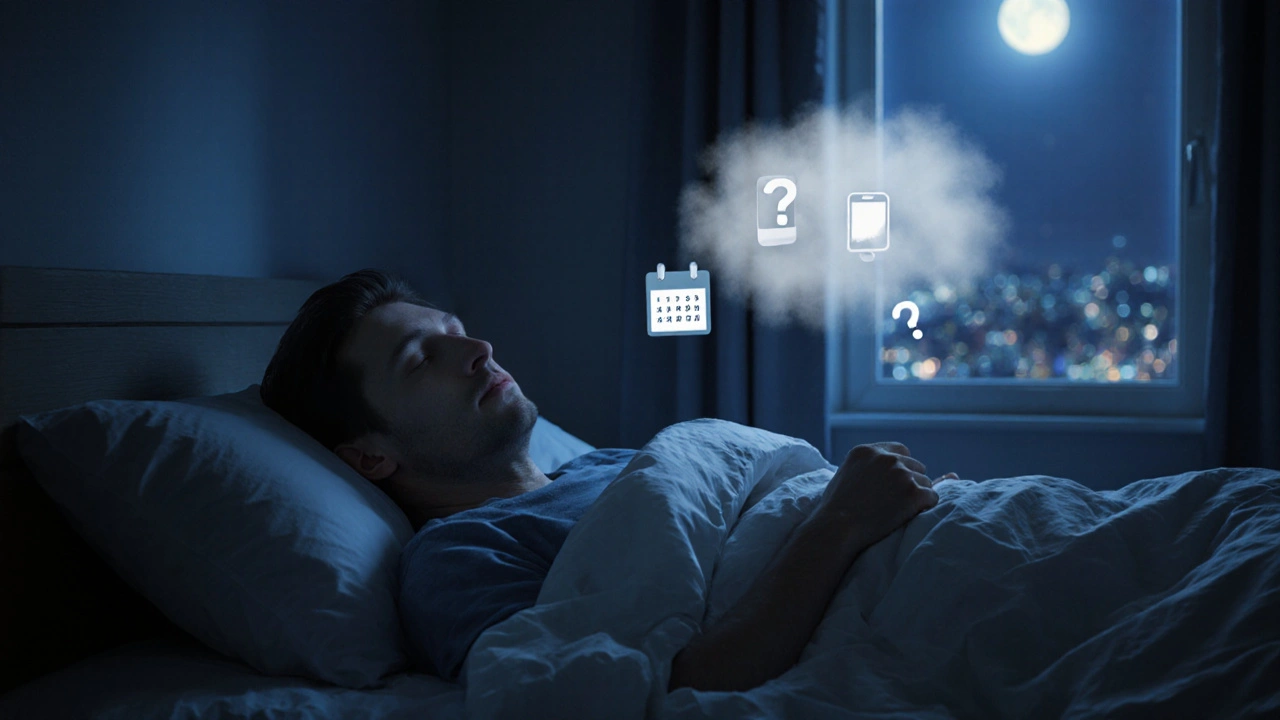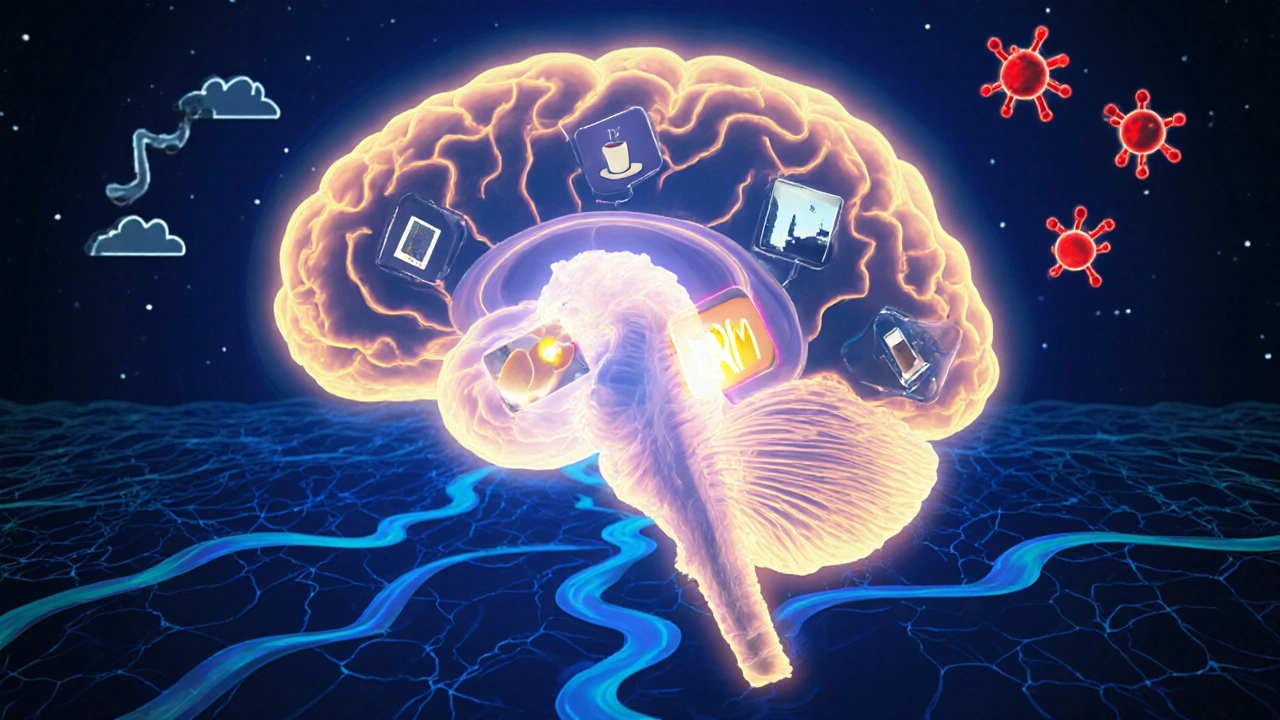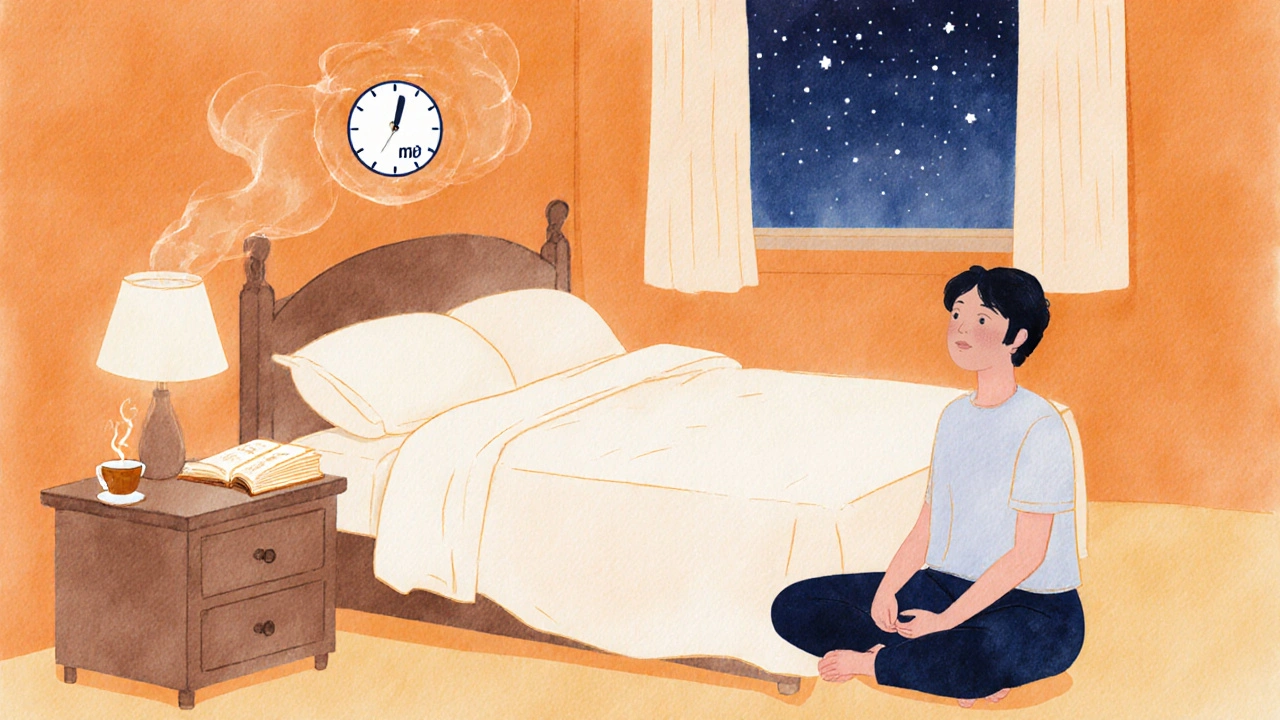Insomnia and Memory: How Poor Sleep Harms Your Brain
 Oct, 9 2025
Oct, 9 2025
Insomnia & Memory Impact Simulator
Memory Impact Summary
Working Memory
Impact:
Symptoms:
Declarative Memory
Impact:
Symptoms:
Memory Systems Explained
Working Memory: Holds information temporarily for immediate use (e.g., remembering a phone number).
Declarative Memory: Stores facts and events for long-term recall (e.g., remembering your first day at school).
When you toss and turn night after night, Insomnia is a chronic difficulty falling asleep or staying asleep that affects millions of adults worldwide, and the next morning your brain often feels foggy. Researchers have linked that fog to real gaps in memory, not just a feeling of being "out of it." If you ignore insomnia, those memory lapses can turn into a longer‑term problem.
Why Sleep Matters for Memory
Sleep isn’t just a downtime for the body; it’s an active processing period for the mind. During a full night, the brain cycles through light sleep, deep slow‑wave sleep, and rapid‑eye‑movement (REM sleep) several times. Each stage plays a specific role in consolidating the day’s experiences into lasting memories.
Two memory systems dominate daily life: working memory, which holds information for a few seconds while you solve a problem, and declarative memory, which stores facts and events for the long haul. Without enough sleep, both systems start to falter.
How Insomnia Disrupts Different Types of Memory
Short‑term lapses are the most obvious sign. Ever walked into a room and forgotten why you were there? That’s a classic working‑memory glitch. Studies using the n‑back task-a test where you must recall a stimulus presented several steps earlier-show a 15‑20% drop in accuracy after just one night of sleep deprivation.
Long‑term memory takes a hit too, especially the hippocampus‑dependent declarative memory. The hippocampus, a seahorse‑shaped structure deep in the brain, replays recent experiences during slow‑wave sleep, stitching them into stable networks. When insomnia interrupts this replay, the brain struggles to transfer memories from the hippocampus to the neocortex, where they become permanent.
One 2023 longitudinal study tracked 1,200 adults for five years and found that chronic insomnia sufferers were 30% more likely to report mild cognitive impairment, a precursor to dementia. The link isn’t just correlation; imaging showed reduced hippocampal volume in participants with persistent sleep loss.

The Brain Chemistry Behind the Forgetfulness
Stress hormones also play a starring role. Cortisol, released when you’re stressed, spikes during sleepless nights. Elevated cortisol interferes with synaptic plasticity-the ability of neurons to strengthen connections-making it harder for memory traces to solidify.
Neurotransmitters such as acetylcholine, which surge during REM sleep, are essential for encoding new information. Insomnia blunts this surge, leaving the brain with fewer chemical cues to lock in memories.
Finally, chronic insomnia can dysregulate the glymphatic system, the brain’s waste‑clearance highway that flushes out neurotoxic proteins during deep sleep. Accumulation of these proteins is linked to memory decline and neurodegenerative diseases.
Acute vs. Chronic Insomnia: What Changes Over Time?
| Insomnia Type | Affected Memory Domain | Typical Symptoms | Recovery Time |
|---|---|---|---|
| Acute (≤ 4 weeks) | Working memory, short‑term recall | Day‑to‑day forgetfulness, slower reaction | Days to a week with normal sleep |
| Chronic (≥ 3 months) | Declarative memory, hippocampal consolidation | Persistent word‑finding trouble, difficulty learning new skills | Weeks to months; may need professional treatment |
Acute insomnia often stems from temporary stress-like a looming deadline or a noisy roommate. The brain bounces back once the stressor lifts and a regular sleep pattern returns. Chronic insomnia, however, rewires the brain’s stress response, making the memory deficits more entrenched.
Practical Steps to Safeguard Your Memory Tonight
- Prioritize sleep hygiene: Keep the bedroom cool, dark, and free of screens. The sleep environment alone can shave 20‑30 minutes off the time it takes to fall asleep.
- Mind the caffeine window: Avoid caffeine after 2p.m. Even a single cup in the afternoon can delay REM onset by up to 15 minutes.
- Schedule a brief power‑nap: A 20‑minute nap boosts working memory without entering deep sleep, which can cause grogginess if you nap too long.
- Engage in low‑intensity exercise: A 30‑minute walk after dinner raises body temperature; the post‑exercise cooling period promotes sleep onset and improves slow‑wave activity.
- Use the 4‑7‑8 breathing technique: Inhaling for 4seconds, holding 7, exhaling 8 can reduce cortisol and signal the brain it’s time to wind down.
These habits don’t magically erase insomnia, but they give the brain the best chance to perform its nightly memory‑consolidation rituals.

When to Seek Professional Help
If you’ve tried basic sleep hygiene for more than a month and still wake up feeling groggy, it’s time to consult a sleep specialist. Cognitive‑behavioral therapy for insomnia (CBT‑I) has a 70% success rate in restoring healthy sleep patterns and, by extension, memory performance.
In some cases, underlying medical conditions-like sleep‑apnea, restless‑leg syndrome, or depression-fuel the insomnia. Treating those root causes often yields immediate improvements in both sleep quality and memory.
Don’t wait until memory lapses affect your job or relationships. Early intervention can prevent the long‑term hippocampal shrinkage observed in chronic sufferers.
Key Takeaways
- Both working memory and declarative memory suffer when sleep is cut short.
- The hippocampus needs deep, uninterrupted sleep to move memories into long‑term storage.
- Elevated cortisol and disrupted neurotransmitter cycles are the chemical culprits behind forgetfulness.
- Acute insomnia causes temporary blips; chronic insomnia can lead to lasting cognitive decline.
- Simple sleep‑hygiene tweaks, timed naps, and professional CBT‑I can protect memory even when nights are rough.
Frequently Asked Questions
Can a single night of poor sleep really affect my memory?
Yes. Even one night of total sleep loss can drop performance on working‑memory tests by about 15%. The effect is most noticeable when you try to remember a phone number or follow a multi‑step instruction the next day.
Why does REM sleep matter for memory?
During REM sleep, the brain releases acetylcholine, which strengthens synaptic connections linked to newly learned information. Skipping REM cycles means those connections stay weak, making recall harder.
Is napping a good workaround for insomnia‑related memory loss?
A short 20‑minute nap can boost alertness and working memory without interfering with the night‑time sleep drive. Longer naps risk entering deep sleep, which can leave you groggy and further disrupt your bedtime routine.
Should I take medication to improve my memory if I have insomnia?
Medication can help you fall asleep, but it doesn’t fix the underlying memory‑consolidation problems. CBT‑I and lifestyle changes target the root cause and have been shown to restore both sleep quality and cognitive performance.
What age group is most at risk for memory issues caused by insomnia?
While anyone can experience short‑term memory lapses, adults over 50 are especially vulnerable because age‑related hippocampal shrinkage compounds the effects of chronic sleep loss.

Erica Dello
October 9, 2025 AT 19:49Look, if you’re going to brag about “sleep hygiene” you’d better watch your commas – they’re practically non‑existent here 😅
Sleeping less isn’t just “tired”; it literally erodes working memory and makes you forget why you opened the fridge.
Julie Gray
October 12, 2025 AT 14:29It is imperative to recognize that the pharmaceutical industry has vested interests in perpetuating a narrative that frames insomnia solely as an individual failing rather than a systemic malaise. The dissemination of research funded by sleep‑aid manufacturers subtly biases conclusions toward pharmacological solutions. Such studies often downplay the role of environmental stressors that are, in many cases, engineered by governmental surveillance programs. The ubiquity of electromagnetic emissions from 5G towers, for instance, has been correlated with disturbances in melatonin production, yet this fact is conspicuously absent from mainstream discourse. Moreover, the data indicating that chronic insomnia can precipitate hippocampal atrophy is deliberately obfuscated to protect profit margins. The subtlety of this manipulation lies in the language of the papers, which employ euphemisms like “sleep maintenance difficulty” to mask the severity of the condition. One must also consider the covert partnerships between sleep clinics and insurance providers, wherein diagnoses are inflated to generate revenue streams. The regulatory agencies tasked with safeguarding public health are, paradoxically, staffed by individuals who hold stock in the very companies they are supposed to regulate. This conflict of interest creates a feedback loop that reinforces the myth of “personal responsibility” for sleeplessness. The resultant policy environment discourages investment in non‑pharmacological interventions such as cognitive‑behavioral therapy, which would otherwise empower individuals to reclaim restorative sleep. The suppression of such alternatives is not accidental; it is a calculated effort to maintain market dominance. Additionally, the social media algorithms that amplify sensationalist headlines about “miracle sleep hacks” are in reality engineered to increase ad revenue for corporations with dubious motives. The cumulative effect of these manipulations is a population that is both sleep‑deprived and unaware of the underlying forces at play. Consequently, the rise in cognitive decline associated with chronic insomnia should be interpreted as a public health crisis engineered by powerful interests. Vigilance, therefore, is not merely advisable but required to dismantle this elaborate facade.
Lisa Emilie Ness
October 15, 2025 AT 09:09Boundaries matter; keep the discussion on sleep, not politics.
Emily Wagner
October 18, 2025 AT 03:49When you think of memory you often picture a warehouse; but the brain is more like a bustling market where information is bartered nightly.
Insomnia throws a wrench into that trade, causing the stalls to close early.
Working memory suffers first because its goods are perishable, while the long‑term archives await the deep‑slow wave deliveries.
Without those nightly shipments, the hippocampus can’t file the receipts properly.
This leads to those awkward moments of forgetting why you walked into a room.
So, think of sleep as the night‑shift courier for your thoughts.
Mark French
October 20, 2025 AT 22:29I totally understand how frustating it can be when you cant remember simple things after a rough night.
It’s not just in your head – it’s a realbiological process.
Try to keep a consistent bedtime routine and give yourself some grace.
Daylon Knight
October 23, 2025 AT 17:09Oh great another article telling us to turn off our phones – like that’s the only thing keeping us awake.
Jason Layne
October 26, 2025 AT 10:49The premise that insomnia is a benign inconvenience is a dangerous fallacy propagated by those who profit from our sleeplessness.
First, the chronic activation of the hypothalamic‑pituitary‑adrenal axis leads to sustained cortisol elevation, which directly impairs synaptic plasticity.
Second, the attenuation of acetylcholine release during REM sleep deprives neural circuits of the necessary reinforcement signals for memory consolidation.
Third, the glymphatic clearance mechanism stalls, allowing neurotoxic proteins to accumulate, a condition correlated with neurodegeneration.
Fourth, epidemiological data consistently shows a dose‑response relationship between sleep duration and cognitive decline, refuting any notion of a safe threshold.
Fifth, the pharmaceutical lobby suppresses public education campaigns that would empower individuals with non‑drug interventions.
Sixth, the media’s sensationalist coverage distracts from the structural reforms needed in healthcare policy.
Seventh, the pervasive use of blue‑light emitting devices is not a coincidence; it is a calculated market expansion tactic.
Eighth, the lack of insurance coverage for CBT‑I forces patients into a cycle of dependence on sedatives.
Ninth, the scientific community’s reluctance to publish null results creates a biased literature that overstates the efficacy of sleep aids.
Tenth, the rising incidence of early‑onset dementia in younger populations aligns temporally with the proliferation of 24/7 connectivity.
Eleventh, the political push to normalize “always‑on” work cultures erodes the societal value placed on rest.
Twelfth, the dismissal of sleep science as “soft” undermines evidence‑based policy.
Thirteenth, the conspiracy that insomnia is merely a personal failing masks the systemic exploitation of the working class.
Fourteenth, the continued underfunding of sleep research hampers the development of innovative non‑pharmacological solutions.
Fifteenth, it is incumbent upon each of us to demand transparency and prioritize restorative sleep as a public right.
Hannah Seo
October 29, 2025 AT 05:29Here’s a concise action plan you can try tonight: first, dim the lights an hour before bed and avoid screens; second, perform a gentle breathing exercise such as the 4‑7‑8 method; third, write down any intrusive thoughts in a journal to offload them; fourth, keep your bedroom temperature around 65°F; finally, aim for a consistent wake‑up time even on weekends. These steps collectively support both working and declarative memory consolidation.
Victoria Unikel
November 1, 2025 AT 00:09I feel the same way sometimes.
Sleep matters more than we think.
Lindsey Crowe
November 3, 2025 AT 18:49Wow, groundbreaking insight about naps.
Rama Hoetzlein
November 6, 2025 AT 13:29Listen up, the whole narrative about “just get more sleep” is a smokescreen designed to keep us docile 😊.
First, the government’s hidden agendas include deploying low‑frequency sound waves that disrupt slow‑wave sleep, a fact omitted from any reputable study.
Second, major tech corporations embed subliminal cues in their devices to prolong screen time, directly sabotaging REM cycles.
Third, pharmaceutical giants flood the market with hypnotics that mask the underlying neurochemical imbalances rather than fixing them.
Fourth, the media amplifies “quick fix” stories while ignoring the systemic roots of insomnia.
Fifth, the suppression of research on alternative therapies is orchestrated to protect profit margins.
Sixth, the education system’s early start times clash with adolescents’ circadian rhythms, a deliberate policy to produce a compliant workforce.
Seventh, the rise in chronic insomnia correlates with increased surveillance, suggesting a psychological impact of constant monitoring.
Eighth, the expansion of shift work without adequate recovery periods is a capitalist strategy to maximize output at the cost of cognitive health.
Ninth, the “sleep hygiene” checklist is sold as a commodity, turning self‑care into a marketable product.
Tenth, the lack of universal healthcare coverage for CBT‑I forces many into dependence on medication.
Eleventh, the lobbying efforts of sleep‑aid manufacturers ensure that insurance reimbursements favor drugs over therapy.
Twelfth, the cultural stigma attached to admitting sleeplessness discourages open discussion, perpetuating the silence.
Thirteenth, the neuroscientific community’s reluctance to challenge entrenched paradigms hinders progress.
Fourteenth, the public’s trust in institutions erodes as these hidden mechanisms become more apparent.
Fifteenth, we must remain vigilant, question authority, and demand transparent research funding.
Sixteenth, only then can we reclaim our nights and protect our memories from corporate erosion.
Lorena Garcia
November 9, 2025 AT 08:09I’m curious how much of the memory decline is actually reversible once someone gets consistent sleep again.
If I start tracking my sleep stages, could I see a measurable improvement in my daily recall?
Any tips on simple tools that don’t require fancy wearables would be great.
Dietra Jones
November 12, 2025 AT 02:49Just a quick note – “its” should be “it’s” in the second paragraph, and “affect” is used correctly but “effect” would work better later on.
Overall great info, just a few typo’s to fix.
Victoria Guldenstern
November 14, 2025 AT 21:29Ah yes the age‑old remedy of “just go to bed earlier” – a proclamation so simplistic it borders on the absurd yet somehow continues to dominate public discourse.
One might argue that the very suggestion reveals a profound misunderstanding of neurobiology, but perhaps it is intended as a comforting platitude for the masses weary of scientific nuance.
Nevertheless, it persists, shielded by its veneer of commonsense, while the underlying complexities of glymphatic clearance, hippocampal replay, and synaptic renormalisation are conveniently ignored.
Such reductionist advice, while well‑meaning, ultimately does a disservice to those struggling with chronic insomnia, offering false hope wrapped in brevity.
In reality, the path to restorative sleep is a mosaic of behavioral, environmental, and occasionally pharmacological interventions, each requiring careful calibration.
So, while the slogan endures, let us not be lulled into complacency by its allure.
Bill Bolmeier
November 17, 2025 AT 16:09Hey there, I get how overwhelming it can feel, but remember that every night you commit to a healthier routine is a win for your brain!
Picture your memory as a garden – consistent sleep waters the roots, letting ideas bloom.
Even a short power‑nap can give you that boost you need to tackle the day.
You’ve got the tools; keep at it and watch your recall sharpen.
Darius Reed
November 20, 2025 AT 10:49Wow, that article painted a vivid picture – it’s like our brains are tiny factories, and insomnia is the rogue power outage that throws the whole assembly line into chaos!
The way the author described the hippocampal shrinkage felt like watching a beloved library crumble brick by brick.
It really drives home how essential those deep‑sleep phases are, not just for memory but for keeping our mental cityscape vibrant.
Karen Richardson
November 22, 2025 AT 18:49Sleep deprivation impairs both working and declarative memory; restorative sleep is essential for consolidation.